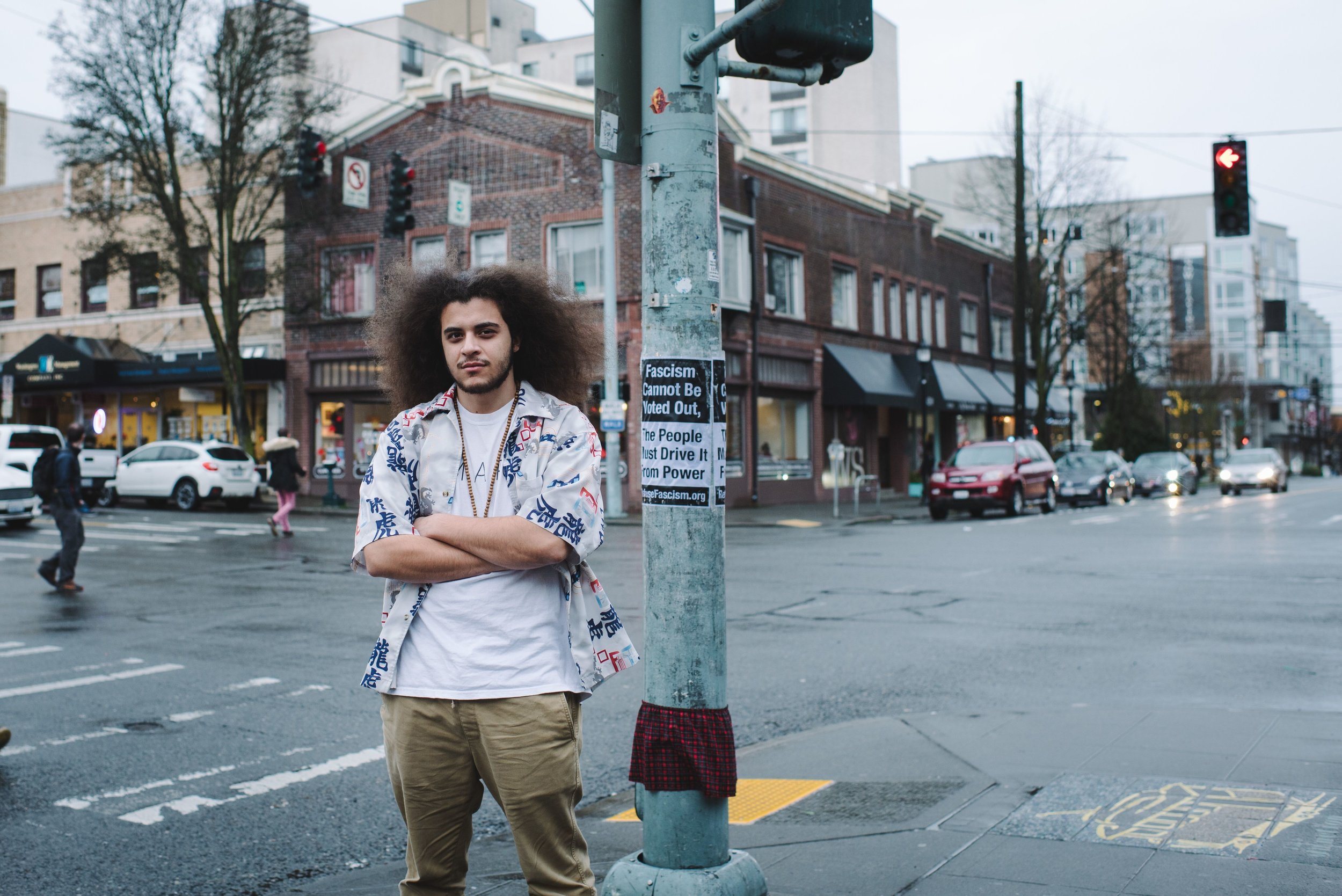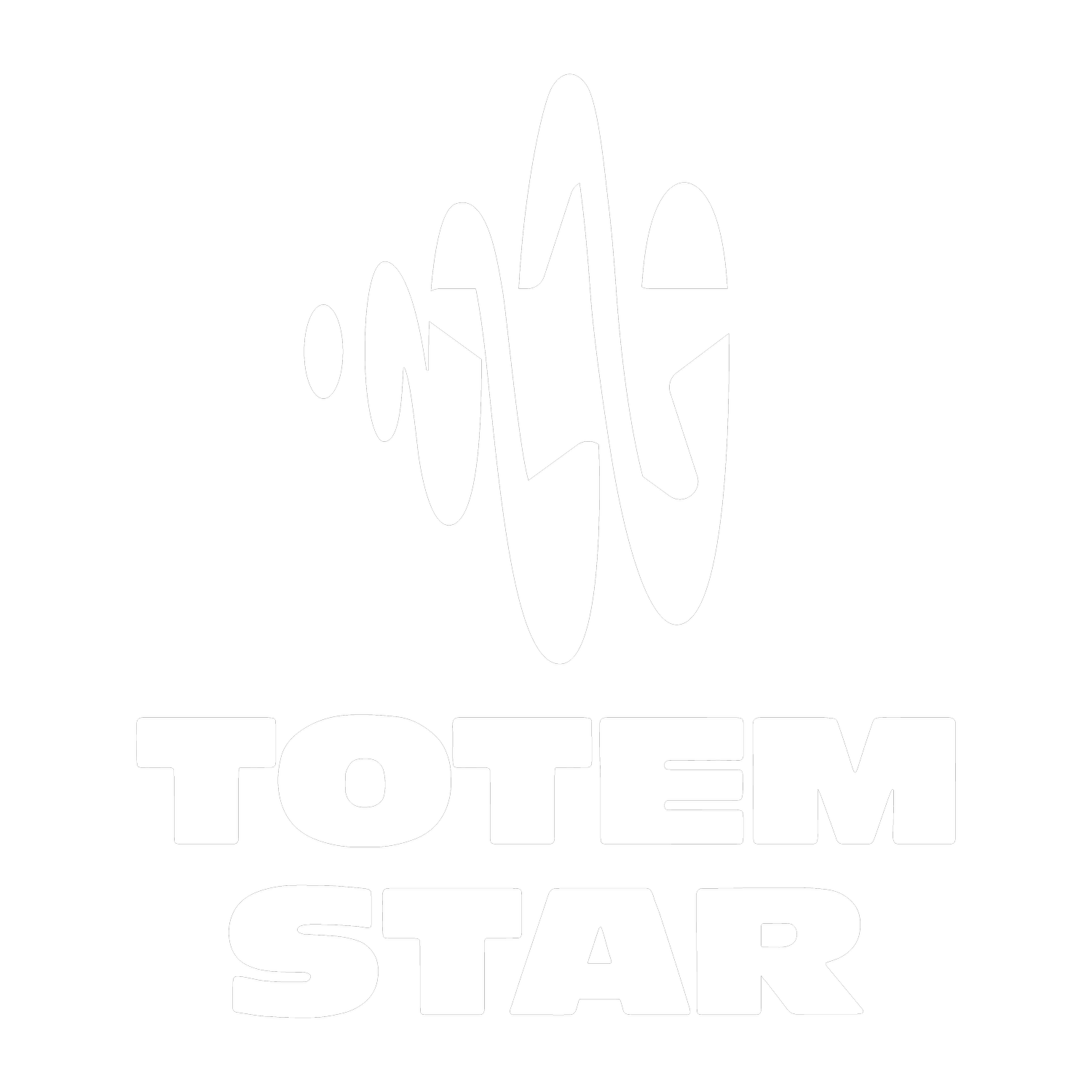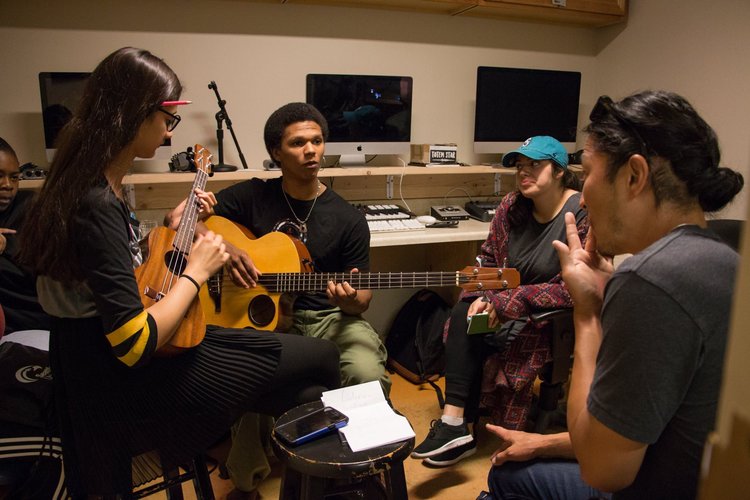
BLOG
The Origins of Totem Star
Totem Star's Inaugural JRA program in 2010
Written by Mirabai Jyothi Kukathas
Totem Star is a truly special place. Here young people can make music, learn from one another (as well as from talented teaching artists) and develop a sense of community. Everyone I know involved here has a deep appreciation and love for this space. But how did Totem Star come to be? It didn’t just emerge from the ether fully formed; it was a labor of love to bring this place into reality. So, I asked co-founder Daniel Pak to recount the origin story of Totem Star.
Mirabai: Pak, what were your goals and hopes for Totem Star when you and Thaddeus founded it in 2010?
Pak: Funny thing is we didn’t even know it was going to be Totem Star when it all started. The Juvenile Rehabilitation Administration (JRA) called in 2010 about doing a two-month summer work training program with ten young people who were just released from detention. We started with ten and ended with ten, which just shows how consistent engagement can do wonders for young people who want to express themselves through music and the arts. I think we called the program Making The Band, or Bars & Beats, or something like that. Not one month after our program ended, we found out that half the group got locked up again. And then we lost one of the leaders of the group. And that’s when we realized this was our calling. We had to ensure that young people had a safe and encouraging place to go to make music and find a creative sanctuary away from the chaos of the streets. So we started applying for grants, and amazingly we were awarded funding, and that’s when we realized we were developing an organization. That’s when Totem Star was born.
M: What kind of challenges did you face when bringing Totem Star into reality?
P: Funding and space have always been the biggest challenges. Without funds we can’t keep the studio open, and even when we have funds, where is the studio going to be? For the first four years we were strictly a mobile operation. We packed our recording studio into a suitcase and lugged it all over the city, from Rainier Community Center to the Northwest African American Museum to the Metrocenter YMCA down to YouthSource in Renton. When our program partners asked what kind of technical support we needed we said we just need a room, a table, and a power outlet. We’d set up the rest and BOOM! - recording studio! Then another challenge arose - we realized that because we had so many different program partners with different pools of young people, we’d see this group of young people for six weeks, develop amazing relationships with them, run out of funding, and then it was "good bye, have a good life" and that never felt good. That’s when we realized this mobile operation wasn’t working and we needed something more sustainable. That’s when we talked to David Bestock at Youngstown Cultural Arts Center and he gave us the keys to the recording studio there, and that’s where we’ve been since 2013. Our humble studio has transformed into a hub for young recording artists and we are full every day of the week with motivated artists making incredible music and building a strong community of voices in the process. Though we are thriving as a community today, funding and space remain our greatest challenges, as constant fundraising is the only way to keep the studio open, coupled with the fact that our current studio space is far too small for the number of youth who come in. We need our own building, with multiple studio rooms for our artists, our own performance space, and an artist lounge where young people can gather and relax in a creative environment.
Youngstown Cultural Arts Center
M: Totem Star constantly evolves and changes, but when did you first feel like Totem Star found its groove or that you started to feel more at ease running it?
P: Totem Star definitely found its groove (and a home) when we made the move to Youngstown Cultural Arts Center in 2013. To be welcomed as a tenant organization and as part of the amazing arts community there is such a big deal. Young people come from all over the city and from as far as Shoreline, Bothell, Burien, Federal Way, and Tacoma for The Studio and The Stage. The family vibe in the studio is always warm and uplifting. And in 2015, we received a major gift - an email from Paul Laughlin who was moving to Seattle to pursue his MPA at the University of Washington. He was asking about a possible summer internship and after a wonderful meeting with him, we onboarded him as a development intern. Paul changed everything for us. He started writing grants, helping develop infrastructure around our development strategy, began helping with programming, handling administrative tasks, organizing our board, and so much more. Today he is our Director of Development and Operations and constantly pushes us forward. I am certain that we would not be where we are today had we not received that email from Paul back in 2015. He’s the ultimate game changer, and to answer your question, we are all more at ease because of him!
M: What are the biggest changes Totem Star has undergone in these past 8 years?
P: I would say other than the move to Youngstown and the addition of Paul as part of our team, the biggest change is the number of diverse young people who find out about Totem Star and want to get involved. We get inquiries every week, which is humbling and overwhelming at the same time. If we had a bigger space and more hours to keep the studio open, everything would be better. We are always under pressure to fit in as many young people into the studio as possible, sometimes having to physically move our workstations to other locations that open up in the building so that more young people can work on their projects. The word on the streets about Totem Star is spreading, and more young people are finding out about Totem Star and wanting to get involved. There is a huge need, which very much reflects the state of how educational institutions are not able to provide music and arts to all young people, especially those from communities with less resources. Once again, there are young people coming from as far as Bothell and Tacoma to get in the studio. What does that tell us about the arts education and opportunity gap for young people? This heightened attention to our programs has definitely brought in more press and recognition by larger organizations, foundations, and even the Seattle Music Commission. All of that attention is great, but at the end of the day, the biggest change that we need to see is more funding, or else this all could go away.
M: What about Totem Star do you most wish you had access to when you were in high school?
P: Mentors. Positive adult role models who really care. Mentors who live and breathe social justice just as much as they do compression and equalization. I never really had a mentor when I was in high school. And maybe that was my fault for not reaching out. And as an adult, I’m always looking for mentors. Embracing fear and vulnerability is the only way we can grow. And mentors always seem to help make it easier to understand.
What Is Abel Listening To?
https://www.gofundme.com/AbelACLU
Take a quick glimpse into the current vibe, inspiration, and story of Totem Star artists.
Abel, what song do you currently have on repeat?
The song that I currently have on repeat is "Change" by J. Cole. In the broader sense, the song just talks about how change is to come: change in racial inequality, change in our habits, and change in the obstacles we face.
What do you really like about this song?
I really love the long because of the beat and the occasional vocal parts that intertwine with the rapping. The song really just gives me hope; there is better to come and there will be better days. I listen to this song whenever I am working on stuff, and especially when I need some motivation. I started listening to J. Cole since his Forest Hill Drive album, so I listened to his 4 Your Eyez Only album when it came out as well.
Do you have any other music recommendations?
I recommend people to listen to Frank Ocean, specifically the songs Biking, Pink + White, and Nights. Just really love the vibes those songs gives and it reminds me of summer.
5 Ways To Improve Your Self Confidence As A Musician
Totem Star Artist, Mirabai Kukathas shares her honest tips on how to improve your self-confidence when it comes to performing as a music artist.
Jawzilla in the element
Written by Mirabai Jyothi Kukathas
They say write what you know, but here I am doing quite the opposite. One of the biggest reasons I don’t write music or perform that often is that I lack the self confidence. When I sit down to write I hear a voice telling me not to bother. Every performance I’ve been a part of has been preceded by intense stage fright. So why am I, a person with very little self esteem, especially in regards to music, giving you tips on becoming more confident? Well, because my boss told me to. No, I’m just kidding; it’s because I’ve been working to become more confident and know first hand what’s helpful and what's complete nonsense. Now, you might be thinking, but Mirabai, unlike you, I am not a nervous wreck, to which I say, good for you but everyone gets nervous, especially preforming artists. I think it's really important to keep the following things in mind, so without further ado… HOW NOT TO BE A NERVOUS WRECK, written by a nervous wreck because primary sources are important.
Be kind to yourself. Usually people save the most important piece of advice until the end of the list, but I’m going to put it first on the off chance you get bored and stop reading to go watch a cat video or make some toast or something. Recently, I was asked how I'd want a friend to react if I was experiencing anxiety before a performance, or even just in every day life. I said that I'd appreciate kindness and honesty. I realized a lot of people would say the same, but I was not treating myself with those qualities and often neither do others. . It’s easy to treat your loved ones with kindness or to crave kindness from them, but most people are far less willing to be easily excited, forgiving, or appreciative when it comes to themselves. So, be kind to yourself because you are pretty damn awesome.
Practice. This one’s pretty short, sweet, and obvious but it works: if you practice something you feel self conscious about, you will improve. If you improve, you will become less self conscious abut it. This is especially true in regards to music. You’ve probably noticed that you feel more at ease performing a song you’ve practiced a million times or that writing a song is a less daunting task if you’ve done it before. Practice makes perfect.
Learn that it’s okay to be only or less than okay. Okay, I lied: Practice doesn't make perfect. There is no such thing as perfect, yet most humans expect themselves to somehow achieve this delusional aspect. A lot of self consciousness derives from the idea that you should be flawless at whatever you’re doing. We have these crazy expectations of ourselves, and when they aren’t met we get upset. I recently wrote a song which for some reason I decided had to be fantastic. When I felt that it wasn’t, I got really down on myself. The song was, in all honesty, pretty bad, but looking back on it with kindness (see no.1) I’ve decided that’s perfectly okay.
Surround yourself with supportive people. I understand that this isn’t always an option, but when it is, it’s insanely helpful. I assume that at at least one point in your life you have been around people who have put you down; who have made you feel less than. It really sucks. That’s why having a community of people who lift you up and vocalize the best parts of you is really amazing. It makes you want to make music and share it with your community. For me, Totem Star is that community. That's why the power of collaboration is so strong. You and your collaborators can teach each other and build yourselves up. I know it can sometimes feel like other people are able to create musical magic out of thin air, but they aren't and you'll see that through working together. So go write something with your friends.
Celebrate the little victories. You wrote a song? It wasn’t very good? I have no idea what that must feel like, but congratulations! You wrote a song, that’s impressive, I’m proud of you, and you should be proud of yourself! You can always push yourself to make it better or you can write a new song that resonates with you more or perform something that showcases your talents and views more coherently, but always be proud of what you’ve accomplished. Big victories always begin with the little ones.
Here are a couple links if you want to read more on the subject.
How Much Does Confidence Affect Musical Ability? by Anthony Cerullo from Sonicbids
Becoming a Confident Performer by Gerald Klickstein from Musicians Way
ALLI 2017
L to R: LIO, Mirabai Kukathas, Zora Seboulisa, Monica Elenes, and Daniel Pak. Photo Credit: Amy Piñon
Written by Mirabai Jyothi Kukathas
The first week of July 2017 was one of the best weeks of my life. Totem Star, Youth Speaks, and our awesome mutual sponsor Arts Corps put on the Arts Leadership Liberation Institute (ALLI) for the second year running. ALLI is a weeklong art intensive for poets, musicians, and visual artists. We spent the week building community, partaking in social justice-related workshops, and creating pieces of art to share at the end of the week.
When I applied to ALLI, I didn’t think I would actually get in. I knew some of the people involved and didn’t think I was accomplished enough to spend a week with such talented artists. When I did get in, I was both excited and incredibly nervous. However, my nerves melted away almost as soon as I walked into Youngstown Cultural Arts Center, where ALLI was held. One thing that cannot be said enough about the Youthspeaks/Totem Star family is how kind and welcoming it is.
We spent the majority of the first day getting to know one another. We began with everyone putting an object of emotional value in the center of the circle we sat in, summing up the object’s significance in one or two words. We went back around the circle and everyone took an object that symbolized something they needed more of in their lives. I put in a statue of the goddess Saraswati, symbolizing ancestry and inspiration, and took a picture which represented resiliance. At the end we gave the items back to their owners, thanking them for the characteristics they embodied. It was so nice to fill up the room with love and strength, and doing so really set the tone for the supportive environment of ALLI.
LIO wows the crowd with her poetry. Photo credit: Amy Piñon.
For the rest of the week we’d spend the mornings together, still getting to know each other, learning about outreach and organization, and even taking a workshop led by Anakbayan. In the afternoon we would divide into our three pathways (spoken-word poetry, music, and visual art) and get working on our pieces. I loved catching glimpses of half-finished paintings and hearing snippets of poems when I popped out into the hall. The whole place seemed alive with art and excitement.
During the course of the week, my friend Zora and I wrote a song. It started off as just a baseline and a short poem of hers, but together we expanded the lyrics and wrote a melody. For the most part she did the lyrics and I did the melody, but worked together for the entire process, bouncing ideas off each other and getting excited after our eureka moments. At the end of the week we had created something I was really proud of, something I never thought I’d be able to to do. For me, that was the best part about ALLI: doing something I never thought I could. Proving myself wrong. Gaining some confidence.
The song-writing process. L to R: Zora and Mirabai. Photo credit: Amy Piñon.
At the end of the week we put on a block party, open mic, and showcase. A bunch of people from the community showed up (some even brought food!), got to know each other, performed at the open mic, and partook in the general awesomeness. The showcase itself was electric; I could not believe everyone created what they did in just five days. It’d been a long time since I’d performed in front of people, but when I was singing up there everything felt right. I owe a lot to ALLI for getting me into the Youth Speaks/Totem Star community, building my confidence and skills, and for a truly amazing week I will never forget.
To see more ALLI stories, click here.
To see all performances from the ALLI showcase, click here










